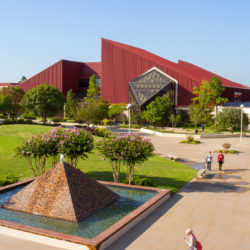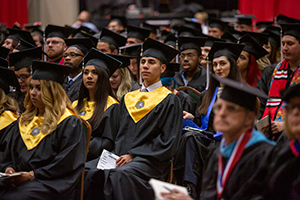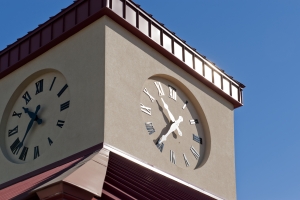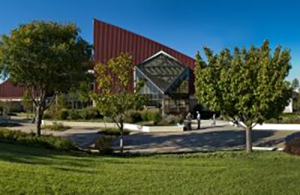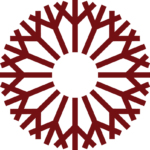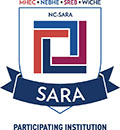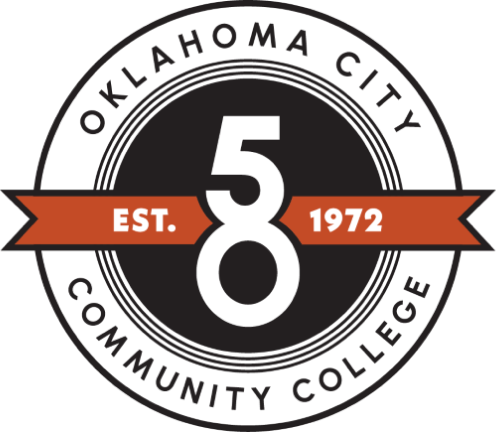Copyright File Sharing
Copyright File Sharing
Copyright File Sharing
OCCC's Information Technology Resources Acceptable Use Policy, available online at /policy/3058.pdf, provides that users shall respect the copyright and intellectual property rights of others and comply with intellectual property and copyright law in downloading, uploading and distributing copyrighted materials, such as music and video files.
What are copyright and copyright infringement?
What is the fair use exemption to copyright?
What are the legal consequences for unauthorized distribution of copyrighted material?
Are there legal alternatives to illegally downloading or otherwise acquiring copyrighted material??
What are copyright and copyright infringement?
Under U.S. law, a work is copyrighted when it is created and fixed in a tangible medium of expression for a length of time. The author/creator of the work is given exclusive rights to do or to authorize the following:
- To reproduce the copyrighted work in copies;
- To prepare derivative works based upon the copyrighted work;
- To distribute copies of the copyrighted work to the public by sale or other transfer of ownership;
- In the case of literary, musical, dramatic, and choreographic works, pantomimes, and motion pictures and other audiovisual works, to perform the copyrighted work publicly;
- In the case of literary, musical, dramatic, and choreographic works, pantomimes, and pictorial, graphic, or sculptural works, including the individual images of a motion picture or other audiovisual work, to display the copyrighted work publicly; and
- In the case of sound recordings, to perform the copyrighted work publicly by means of a digital audio transmission.
Source: 17 U.S.C. § 106.
If a person or entity that does not own the copyright in a work or does not have the copyright owner's permission does any of the above, then that person or entity is infringing. In the file-sharing context, downloading or uploading substantial parts of a copyrighted work without authority constitutes an infringement. There are many statutory exemptions to these rights. The major exemption is fair use.
What is the fair use exemption to copyright infringement?
The fair use exemption permits reproduction of copyrighted works for a limited and "transformative" purpose such as: criticism, comment, news reporting, teaching (including multiple copies for classroom use), scholarship or research. Under the fair use exemption, the permission of the copyright owner is not required. However, nonprofit educational use does not automatically establish a condition of fair use. Determination of fair use is made on an individual, case-by-case basis. In determining whether any particular use qualifies as fair use, you must consider the following factors:
- The purpose and character of the use, including whether such use is of a commercial nature or is for a nonprofit educational purpose. Have you taken and transformed a portion of the original copyrighted material by adding new information, new insights, new expression or other added value? If yes, it might be fair use.
- The nature of the copyrighted work (creative or factual). Copying factual material is more likely to qualify as fair use.
- The amount and substantiality of the portion used in relation to the copyrighted work as a whole. Generally, the less you take, the more likely the copying will qualify as fair use.
- The effect of the use upon the potential market value of the copyrighted work. If your use deprives the copyright owner of income or a potential market, it is likely not to be fair use.
The fact that a work is unpublished shall not itself bar a finding of fair use if such finding is made upon consideration of all the above factors. In the final instance, the decision on whether a particular use constitutes fair use is made in a court of law.
Source: 17 U.S.C. § 107.
Can OCCC impose sanctions for the unauthorized uploading, downloading or distribution of copyrighted material?
Yes, users who upload, download or distribute copyrighted materials in violation of the law on OCCC networks or the OCCC domain are subject to suspension or revocation of access to OCCC information technology resources and to additional discipline, up to and including academic suspension or expulsion, and/or termination of employment. These penalties are in addition to penalties imposed under civil and criminal law.
In addition, any action that intentionally interferes with or harms the OCCC network system or services will be dealt with as a cyber security attack on OCCC's information technology resources and be subject to more stringent penalties. See OCCC's Information Technology Resources Acceptable Use Policy (policy 3058.pdf) for more information.
What are the legal consequences for unauthorized distribution of copyrighted material?
In addition to OCCC's internal penalties, penalties for copyright infringement include civil and criminal penalties. In general, anyone found liable for civil copyright infringement may be ordered to pay either actual damages or "statutory" damages affixed at not less than $750 and not more than $30,000 per work infringed. For "willful" infringement, a court may award up to $150,000 per work infringed. A court can, in its discretion, also assess costs and attorneys' fees. For details, see 17 U.S.C. §§ 504, 505.
Willful copyright infringement can also result in criminal penalties, including imprisonment of up to five years and fines of up to $250,000 per offense. For more information, please see the Web site of the U.S. Copyright Office at www.copyright.gov, especially their FAQ's at www.copyright.gov/help/faq.
Are there legal alternatives to illegally downloading or otherwise acquiring copyrighted material?
Many sites offer legal downloading of music, movies and other copyrighted material. Some of these options are free, while others have membership fees or charge a fee for each downloaded item. You can find lists of sites offering legal music, video and other downloads compiled by the Recording Industry Association of America and Educause respectively at http://www.campusdownloading.com/legal.htm and http://www.educause.edu/legalcontent. Inclusion of a file-sharing site on these web links does not imply endorsement, sponsorship or promotion by OCCC.
How does OCCC combat unauthorized distribution of copyrighted materials by users of the OCCC network?
OCCC combats unauthorized distribution of copyrighted materials by users of the OCCC network by monitoring traffic and by a vigorous program of accepting and responding to Digital Millennium Copyright Act (DMCA) notices.
OCCC's IITS staff monitors traffic to identify the largest bandwidth users. Monitoring traffic to identify the largest bandwidth helps optimize the availability of OCCC's information technology resources while at the same time assisting in the identification and removal of infringing materials from OCCC's networks and web sites.
OCCC also has a vigorous program of accepting and responding to DMCA notifications of alleged copyright infringement on the OCCC domain.
How does OCCC handle complaints of copyright infringement regarding a student's personal use of copyrighted materials?
OCCC will act expeditiously to remove or disable access to the allegedly infringing material and will inform the computer account holder/user that the allegedly infringing material has been removed or access has been disabled. The computer account holder/user may send OCCC's designated DMCA Agent a "counter notification" in the form of a written statement that the removal or disabling of access was based upon a mistake or misidentification. OCCC will then provide a copy of the counter notification to the person complaining of infringement and inform that person that it will replace the removed material or cease disabling access to the material in ten business days. OCCC will replace or cease disabling access to the material between 10 and 14 days from the date the DMCA Agent received the counter notification, unless the DMCA Agent receives notice from the person complaining of infringement that an action has been filed seeking a court order to refrain from infringement relating to the material on the OCCC domain. You may contact OCCC's designated DMCA agent at dmcaagent@occc.edu or by mail at:
DMCA Agent
Information and Instructional Technology Services
Oklahoma City Community College
7777 South May Avenue
Oklahoma City, OK 73159
The counter notification must include the following:
- A physical or electronic signature of the subscriber.
- Identification of the material that has been removed or to which access has been disabled and the location at which the material appeared before it was removed or access to it was disabled.
- A statement under penalty of perjury that the computer account holder/user has a good faith belief that the material was removed or disabled as a result of mistake or misidentification of the material to be removed or disabled.
- The computer account holder/user's name, address, and telephone number, and a statement that the computer account holder/user consents to the jurisdiction of Federal District Court for the judicial district in which the address is located, or if the computer account holder/user's address is outside of the United States, for any judicial district in which the service provider may be found, and that the computer account holder/user will accept service of process from the person who provided notification.
How do I notify OCCC of an infringement of my copyright?
In accordance with the DMCA, OCCC has designated an agent to receive notifications of alleged copyright infringement on OCCC's domain. If you believe your copyright has been infringed on a website hosted by OCCC, contact OCCC's DMCA Agent at dmcaagent@occc.edu or by mail at:
DMCA Agent
Information and Instructional Technology Services
Oklahoma City Community College
7777 South May Avenue
Oklahoma City, OK 73159
The counter notification must include the following:
All infringement claims must be in writing and must include the following information:
- A physical or electronic signature of the copyright owners or the person authorized to act on the copyright owner's behalf;
- A description of the copyrighted work claimed to have been infringed;
- A description of the infringing material and information reasonably sufficient to permit OCCC to locate the material;
- Your contact information, including your mailing address, telephone number, and email;
- A statement by you that you have a good faith belief that use of the material in the manner complained of is not authorized by the copyright owner, its agent or law;
- A statement that the information in the notification is accurate, and under the pains and penalties of perjury, that you are authorized to act on behalf of the copyright owner.
Failure to include all of this information may result in delayed processing of your complaint.
How will OCCC know that these plans are effective at combating the unauthorized distribution of copyright material?
IITS will develop a timeline to review this policy and the legal alternatives for downloading or other methods of acquisition of copyrighted material. OCCC and IITS will make the results of the procedure review and statistics of enforcement of this policy available to the OCCC community through a website or other means of communication.
